You are here: Foswiki>Dmi Web>ClimateChangeSkeptics (03 Oct 2008, RichardRogers)Edit Attach
Introduction
To what extent are climate change 'skeptics' present in the climate change spaces on the Web? The question is posed in order to gain insight into whether the Web, and the devices that rank information, privilege the skeptics in ways similar to other ‘spheres’ such as the news. Does Google grant the skeptics voice in its returns for a “climate change” query? In the journalistic convention both sides of the story are represented, but in the climate change space provided by Google, the skeptics’ presence is scant.Method
1. Derive list of climate change skeptics.- Locate reliable lists of climate change skeptics, and triangulate, noting which names appear on at least two lists. The list of climate change skeptics is derived from four sources: sourcewatch.com, motherjones.com, wikipedia.org and the sociologists, Aaron McCright and Riley Dunlap.
- Lists of skeptics also sometimes include skeptical organizations, which may be supporters, sponsors and/or sympathesizers. Build a list of skeptical organizations.
- S. Fred Singer
- Robert Balling
- Sallie Baliunas
- Patrick Michaels
- Richard Lindzen
- Steven Milloy
- Timothy Ball
- Paul Driessen
- Willie Soon
- Sherwood B. Idso
- Frederick Seitz
- American Enterprise Institute
- American Legislative Exchange Council
- Center for Science and Public Policy
- Committee for a Constructive Tomorrow
- Competitive Enterprise Institute
- Frontiers of Freedom
- Marshall Institute
- Heartland Institute
- Tech Central Station
- Query Web for climate change, i.e., query Google.com for "climate change". The preferences are set to 100 results.
- The 100 results are copied and pasted into the top box of the Google Scraper, and each skeptic's name is placed in the bottom box, one name per line, e.g. "Steven Milloy".
- The results that are shown in a tagcloud are selected and put into the Tagcloudgenerator. This generator turns the results into a svg file.
- The svg file is opened in Illustrator. Now the results can be ordered into the order of rank from the Google results.
- In the tag cloud is visible how many times a name appears on a a website. The equivalent search in Google is, for example, site:epa.gov "Robert Balling".
Findings
1. There is distance between the skeptics and the top of the search engine returns. Note that few skeptics appear on the Websites of the top ten results in Google. When they do appear (Patrick Michaels, Steven Milloy) their resonance is not particularly resounding. 2. One may evaluate sources according to the frequency with which each mentions the skeptics. There are skeptic-friendly sites, and less skeptic-friendly sites. 3. From the visualization one is able to see the "skeptic-friendly" sources, realclimate.org and, to a lesser extent, climatescience.gov stand out as skeptic-friendly. Sourcewatch also is prominent, albeit as a progressive watchdog group 'exposing' the skeptics. 4. Remarkably, news sites, generally speaking, do not mention the climate change skeptics by name. Whilst news watchers and listeners may have the impression that 'uncertainty' in the climate change 'debate' continues in a general sense (as opposed to, say, in more specific, scientific sub-discussions), 'uncertainty' appears to be discussed without resort to the well-known, or identified, skeptics.Visualizations
- Frederick Seitz:
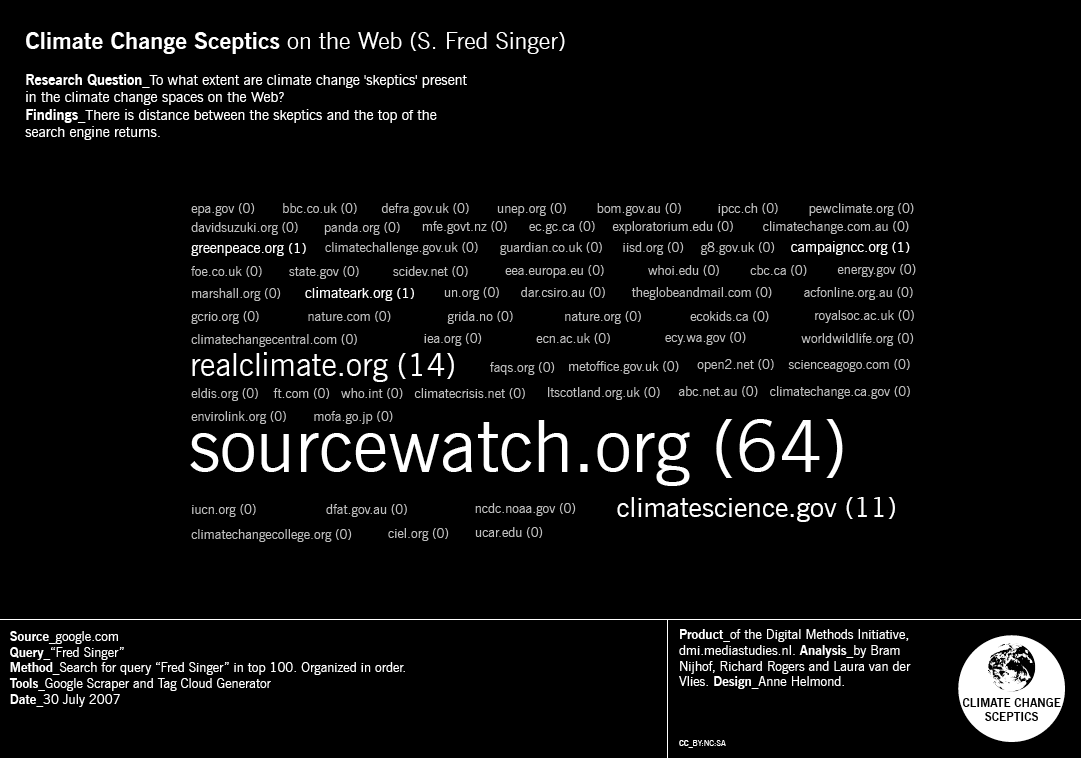
- Fred Singer:

- Patrick Michaels:
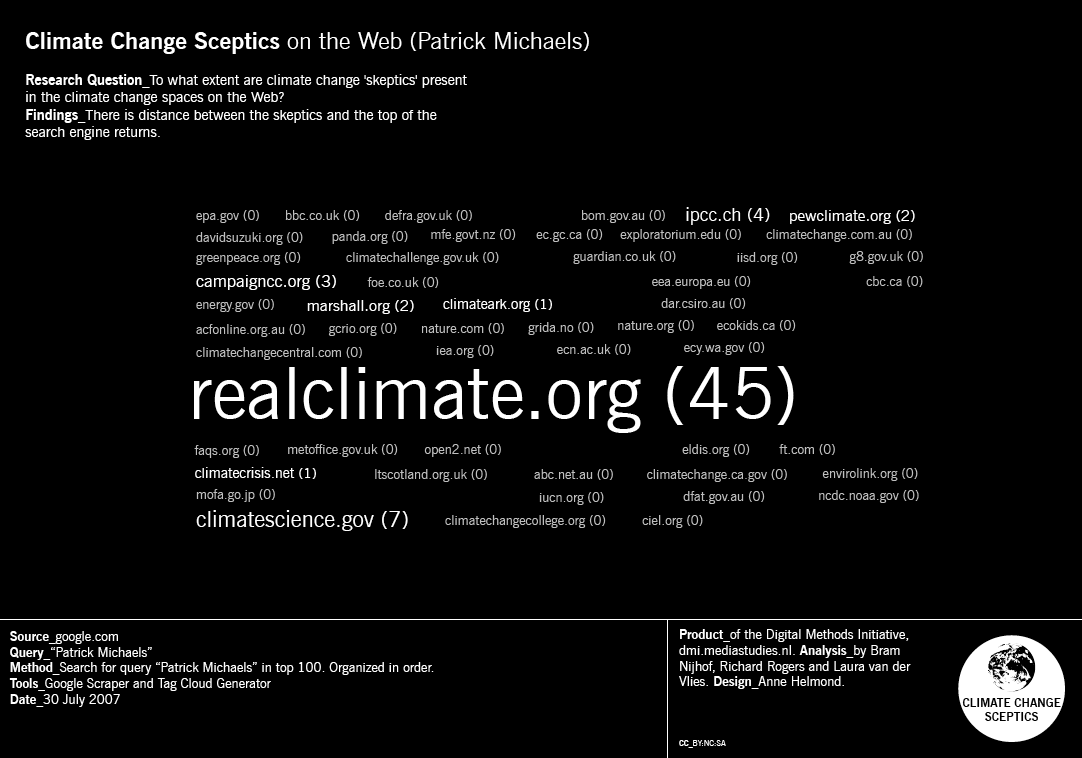
- Paul Driessen:
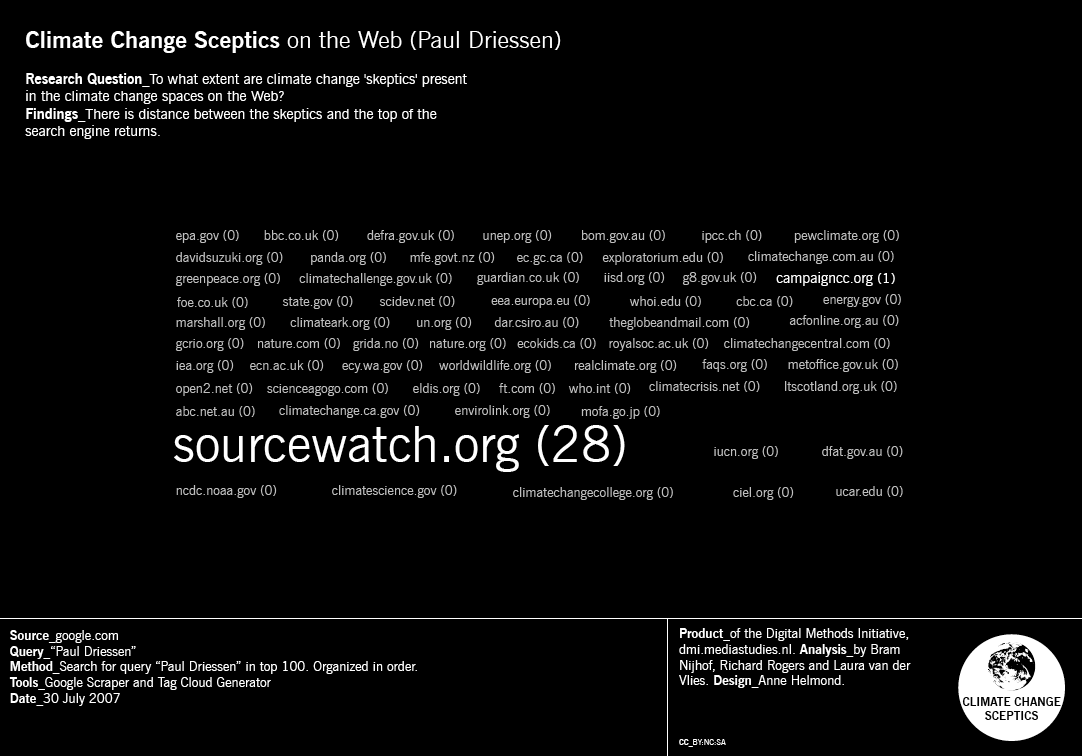
- Richard Linzen:
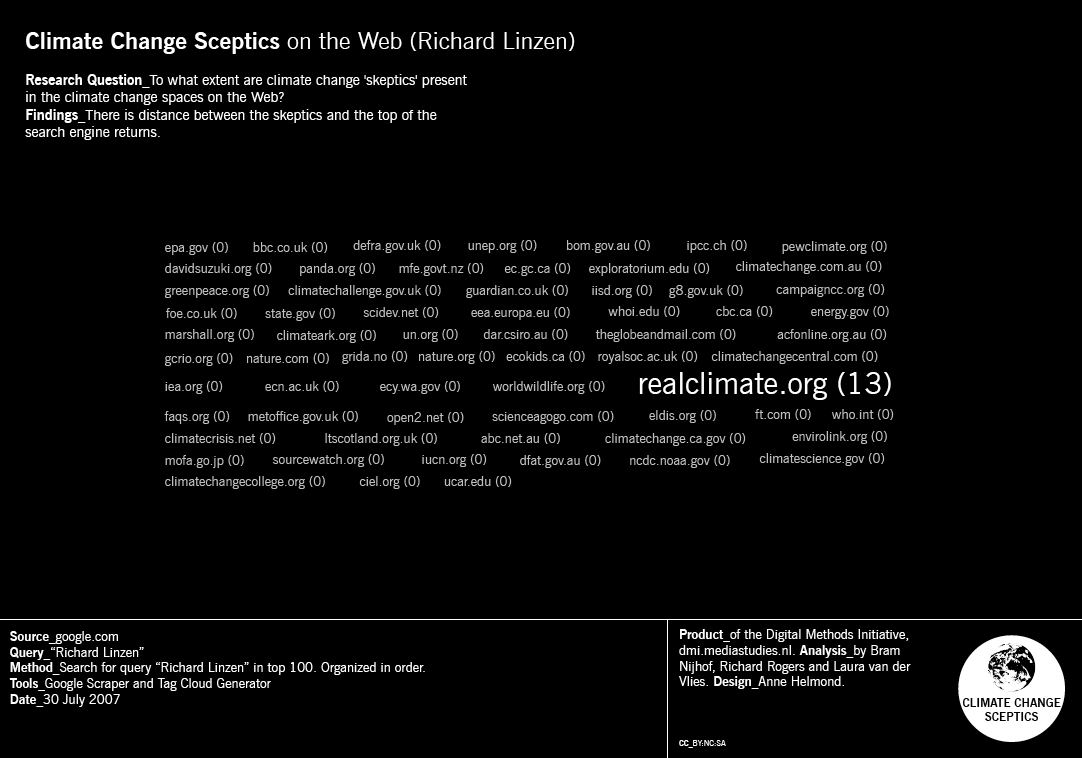
- Robert Balling:
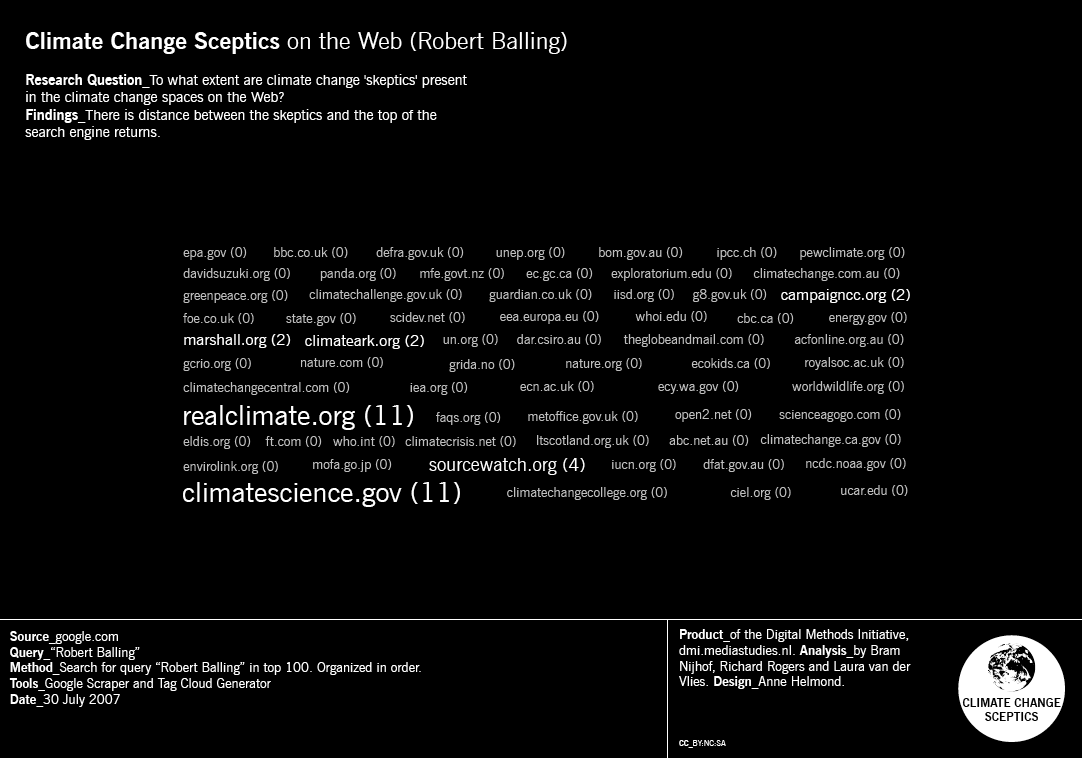
- Sallie Baliunas:
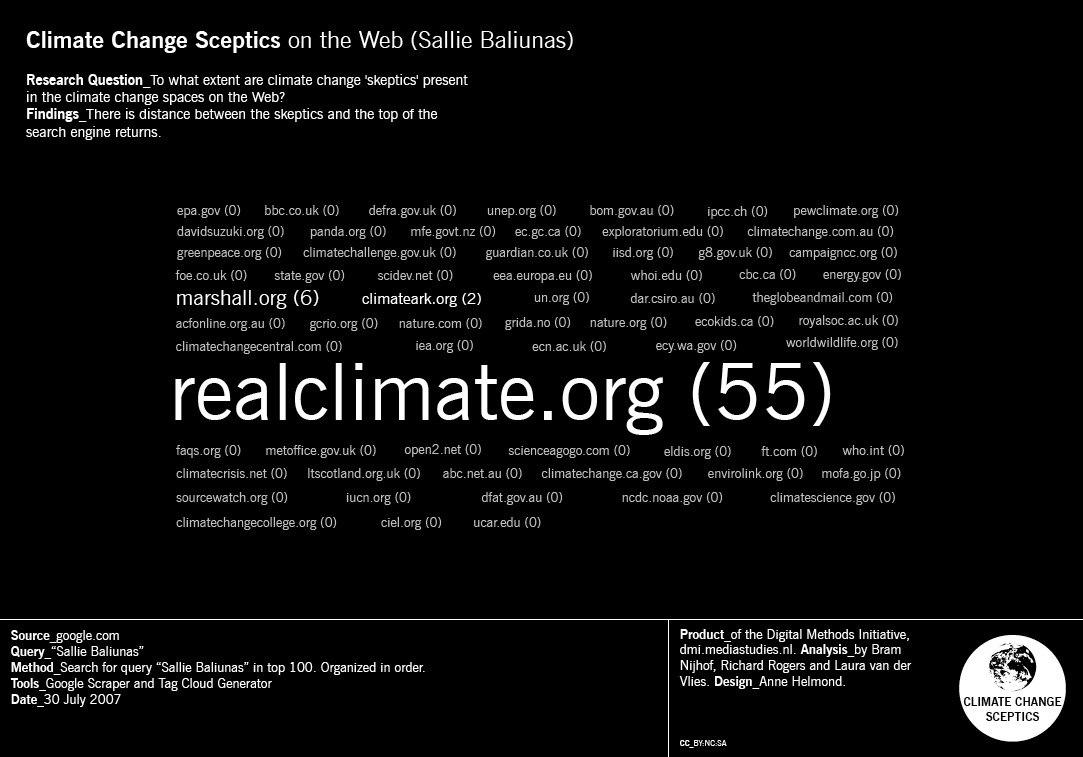
- Sherwood Idso:
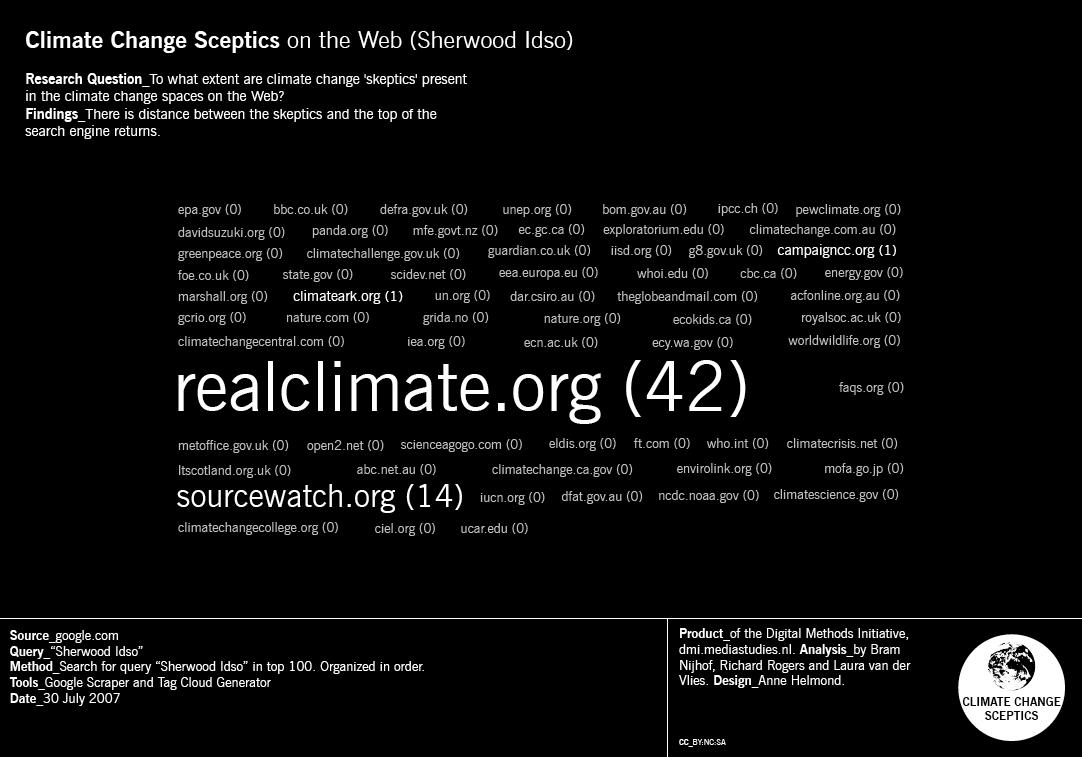
- Steven Milloy:
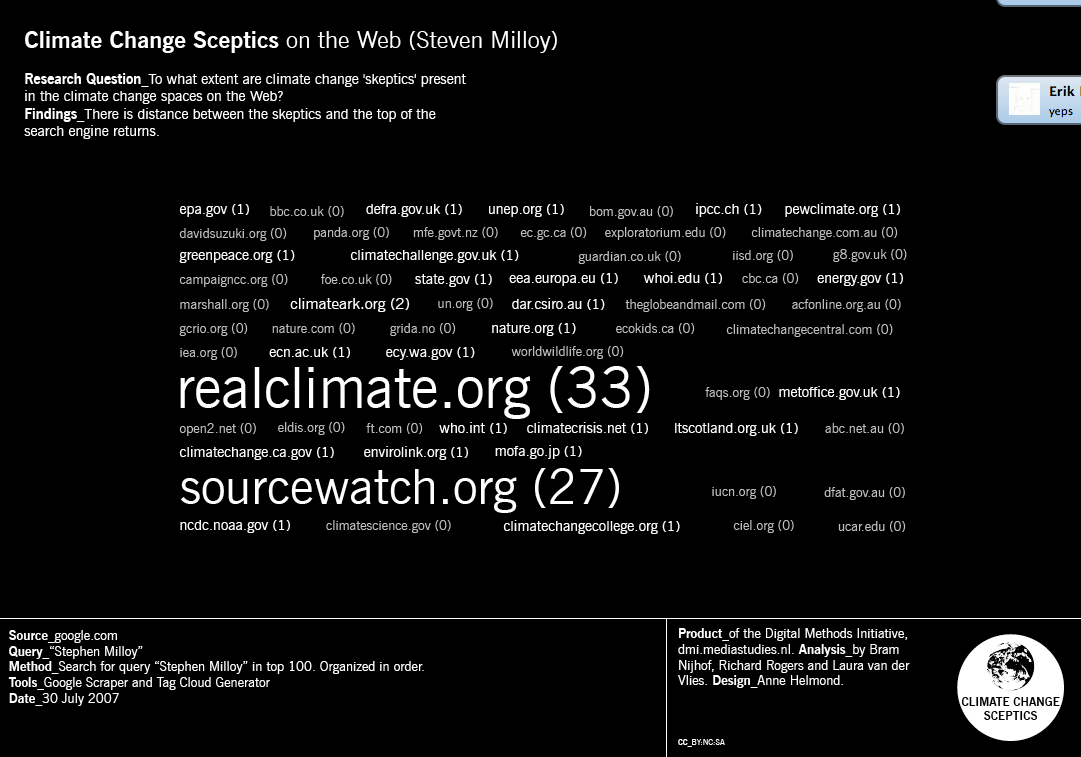
- Timothy Ball:
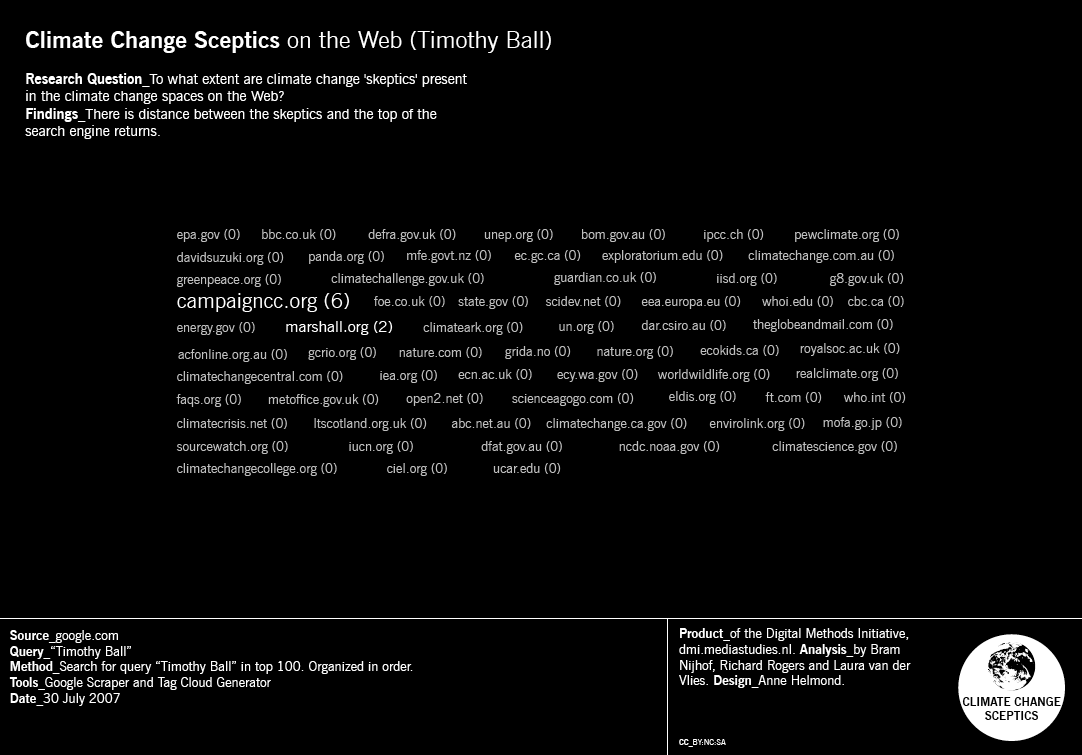
- Willie Soon:
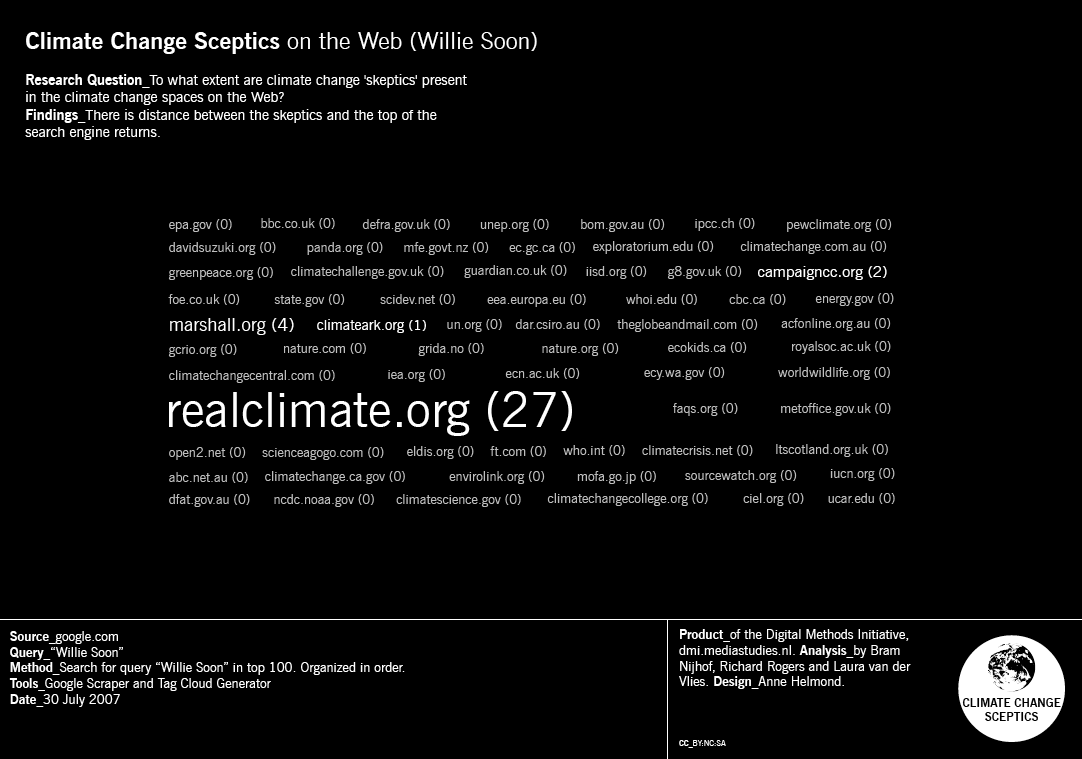
Implications
The question concerns the extent to which the Web stages climate change as a controversy vis a vis other media spaces, such as news. Further research would be to draw a comparison between the skeptics' resonance on the Web and in the news. Additionally, one may wish to expand the work from impact research (non-coded mentions) to coded research, where positive and negative mentions are of interest.References
- Business and Media Institute (2007). "Skeptical Scientists," http://www.businessandmedia.org/specialreports/2007/globalwarming/SkepticalScientists.asp
- Cooperative research. "Scientist Who Wrote Article Skeptical of Global Warming Recruited by ExxonMobil-Funded Organizations". http://www.cooperativeresearch.org/context.jsp?item=BaliunasHooksUpWExxonFundedOrgs
- McCright, Aaron M. and Dunlap, Riley E. (2003). "Defeating Kyoto: The Conservative Movement's Impact on U.S. Climate Change Policy," Social Problems. 50(3): 348-373,http://caliber.ucpress.net/doi/abs/10.1525/sp.2003.50.3.348.
- Mother Jones (2005). "Put a tiger in your think tank". http://www.motherjones.com/news/featurex/2005/05/exxon_chart.html
- Sourcewatch (current). "Global Warming Skeptics". http://www.sourcewatch.org/index.php?title=Climate_change_skeptics
- Union of Concerned Scientists (2007). "Smoke, Mirrors and Hot Air: How ExxonMobil uses big tobacco's tactics to manufacture uncertainty on climate change."http://www.ucsusa.org/assets/documents/global_warming/exxon_report.pdf
- Wikipedia (current). "Global Warming Skeptics". http://en.wikipedia.org/wiki/Category:Global_warming_skeptics
| I | Attachment | Action | Size | Date | Who | Comment |
|---|---|---|---|---|---|---|
| |
FredSinger.jpg | manage | 58 K | 01 Aug 2007 - 09:50 | UnknownUser | |
| |
FredSinger.png | manage | 92 K | 06 Jun 2008 - 11:48 | Main.Laura | |
| |
FrederickSeitz.jpg | manage | 56 K | 01 Aug 2007 - 09:49 | UnknownUser | |
| |
FrederickSeitz.png | manage | 90 K | 06 Jun 2008 - 11:47 | Main.Laura | |
| |
PatrickMichaels.jpg | manage | 56 K | 01 Aug 2007 - 09:51 | UnknownUser | |
| |
PatrickMichaels.png | manage | 86 K | 06 Jun 2008 - 11:48 | Main.Laura | |
| |
PaulDriessen.jpg | manage | 50 K | 01 Aug 2007 - 09:52 | UnknownUser | |
| |
PaulDriessen.png | manage | 84 K | 06 Jun 2008 - 11:49 | Main.Laura | |
| |
RichardLinzen.jpg | manage | 47 K | 01 Aug 2007 - 09:54 | UnknownUser | |
| |
RichardLinzen.png | manage | 81 K | 06 Jun 2008 - 11:49 | Main.Laura | |
| |
RobertBalling.jpg | manage | 51 K | 01 Aug 2007 - 09:55 | UnknownUser | |
| |
RobertBalling.png | manage | 86 K | 06 Jun 2008 - 11:49 | Main.Laura | |
| |
SallieBaliunas.jpg | manage | 53 K | 01 Aug 2007 - 09:56 | UnknownUser | |
| |
SallieBaliunas.png | manage | 87 K | 06 Jun 2008 - 11:53 | Main.Laura | |
| |
SherwoodIdso.jpg | manage | 56 K | 01 Aug 2007 - 09:58 | UnknownUser | |
| |
SherwoodIdso.png | manage | 88 K | 06 Jun 2008 - 11:51 | Main.Laura | |
| |
StevenMilloy.jpg | manage | 61 K | 01 Aug 2007 - 09:59 | UnknownUser | |
| |
StevenMilloy.png | manage | 100 K | 06 Jun 2008 - 11:50 | Main.Laura | |
| |
TimothyBall.jpg | manage | 45 K | 01 Aug 2007 - 10:00 | UnknownUser | |
| |
TimothyBall.png | manage | 82 K | 06 Jun 2008 - 11:52 | Main.Laura | |
| |
WillieSoon.jpg | manage | 49 K | 01 Aug 2007 - 10:01 | UnknownUser | |
| |
WillieSoon.png | manage | 86 K | 06 Jun 2008 - 11:52 | Main.Laura | |
| |
csc_FredSinger_30072007.pdf | manage | 820 K | 08 Dec 2007 - 17:43 | RichardRogers | |
| |
csc_FrederickSeitz_30072007.pdf | manage | 818 K | 08 Dec 2007 - 17:43 | RichardRogers | |
| |
csc_PatrickMichaels_30072007.pdf | manage | 815 K | 08 Dec 2007 - 17:45 | RichardRogers | |
| |
csc_PaulDriessen_30072007.pdf | manage | 819 K | 08 Dec 2007 - 17:45 | RichardRogers | |
| |
csc_RichardLinzen_30072007.pdf | manage | 818 K | 08 Dec 2007 - 17:46 | RichardRogers | |
| |
csc_RobertBalling_30072007.pdf | manage | 816 K | 08 Dec 2007 - 17:46 | RichardRogers | |
| |
csc_SallieBaliunas_30072007.pdf | manage | 819 K | 08 Dec 2007 - 17:47 | RichardRogers | |
| |
csc_SherwoodIdso_30072007.pdf | manage | 817 K | 08 Dec 2007 - 17:47 | RichardRogers | |
| |
csc_StevenMilloy_30072007.pdf | manage | 804 K | 08 Dec 2007 - 17:48 | RichardRogers | |
| |
csc_TimothyBall_30072007.pdf | manage | 816 K | 08 Dec 2007 - 18:05 | RichardRogers | |
| |
csc_WillieSoon_30072007.pdf | manage | 816 K | 08 Dec 2007 - 18:07 | RichardRogers |
Edit | Attach | Print version | History: r16 < r15 < r14 < r13 | Backlinks | View wiki text | Edit wiki text | More topic actions
Topic revision: r16 - 03 Oct 2008, RichardRogers
 Copyright © by the contributing authors. All material on this collaboration platform is the property of the contributing authors.
Copyright © by the contributing authors. All material on this collaboration platform is the property of the contributing authors. Ideas, requests, problems regarding Foswiki? Send feedback


